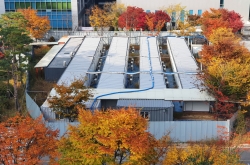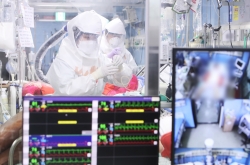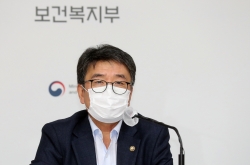 |
People line up to take COVID-19 tests outside a public health center in Songpa, southern Seoul, on Friday. (Yonhap) |
South Korea marked a record high for a third consecutive day in the number of COVID-19 patients admitted to hospitals’ intensive care units, amid the country’s phased return to normal.
According to a situation report from the Korea Disease Control and Prevention Agency, 475 COVID-19 patients were undergoing intensive care treatment as of Thursday at midnight, on top of the 4,178 patients who were hospitalized but did not require intensive care.
In Seoul, which accounted for about 40 percent of all newly confirmed cases, slightly over 75 percent of the city’s intensive care beds were spoken for by late Wednesday, surpassing threshold for pausing the return to normal. The government’s guidance on Oct. 29 had set an occupancy rate of 75 percent as the limit for activating the contingency plan, which reinstates curbs like curfews for high-risk businesses. Nationwide, 58 percent of all intensive care beds had been filled.
So far in November, 17 patients have died with COVID-19 per day on average, up from October’s average of 12.
The death rate fell from 3.03 percent at the height of the wave of nursing home outbreaks in January to 0.35 percent in June, by which time people in their 70s and older were getting vaccinated. Then the fourth wave, brought on by the summer reopening, pushed the rate to 0.69 percent in October after the nation recorded the highest number of new cases in late September. In the first week of November, the rate rose even further to 0.78 percent.
The National Medical Center, the largest state-run hospital, said in an internal report submitted to the Ministry of Health and Welfare on Tuesday that the number of daily deaths could rise to over 50 if the recent trajectory continues, according to local media reports.
In response, the ministry’s spokesperson Son Young-rae said the report was intended for internal review, and that 50-something deaths occurring daily was part of “one of the possible scenarios where up to 10,000 cases are found each day.” The ministry had recently ordered hospitals to empty at least 4 percent of their beds to take in COVID-19 patients to allow for such a scenario with as many as 10,000 cases being confirmed per day.
Lee Ki-il, a senior Health Ministry official, told a news briefing Friday that people ages 60 and older made up nearly 80 percent of all intensive care hospitalizations and 96 percent of all deaths.
To turn deaths and hospitalizations around, he said booster shots may be offered five months after the completion of a primary vaccine series instead of six months for vulnerable populations. In addition, care workers and other professionals working with older adults will now be required to take PCR tests twice a week.
Son of the ministry stressed people who haven’t been vaccinated are at least five times more likely to die of COVID-19 or require hospitalization than people who have been vaccinated. As more places have now opened without the safety restrictions previously in place, unvaccinated people are advised to exercise more caution, he said.
By Thursday’s end, 81 percent of 51 million people in Korea had received at least a single round of vaccination, while 77 percent had been fully vaccinated.
By Kim Arin (
arin@heraldcorp.com)











